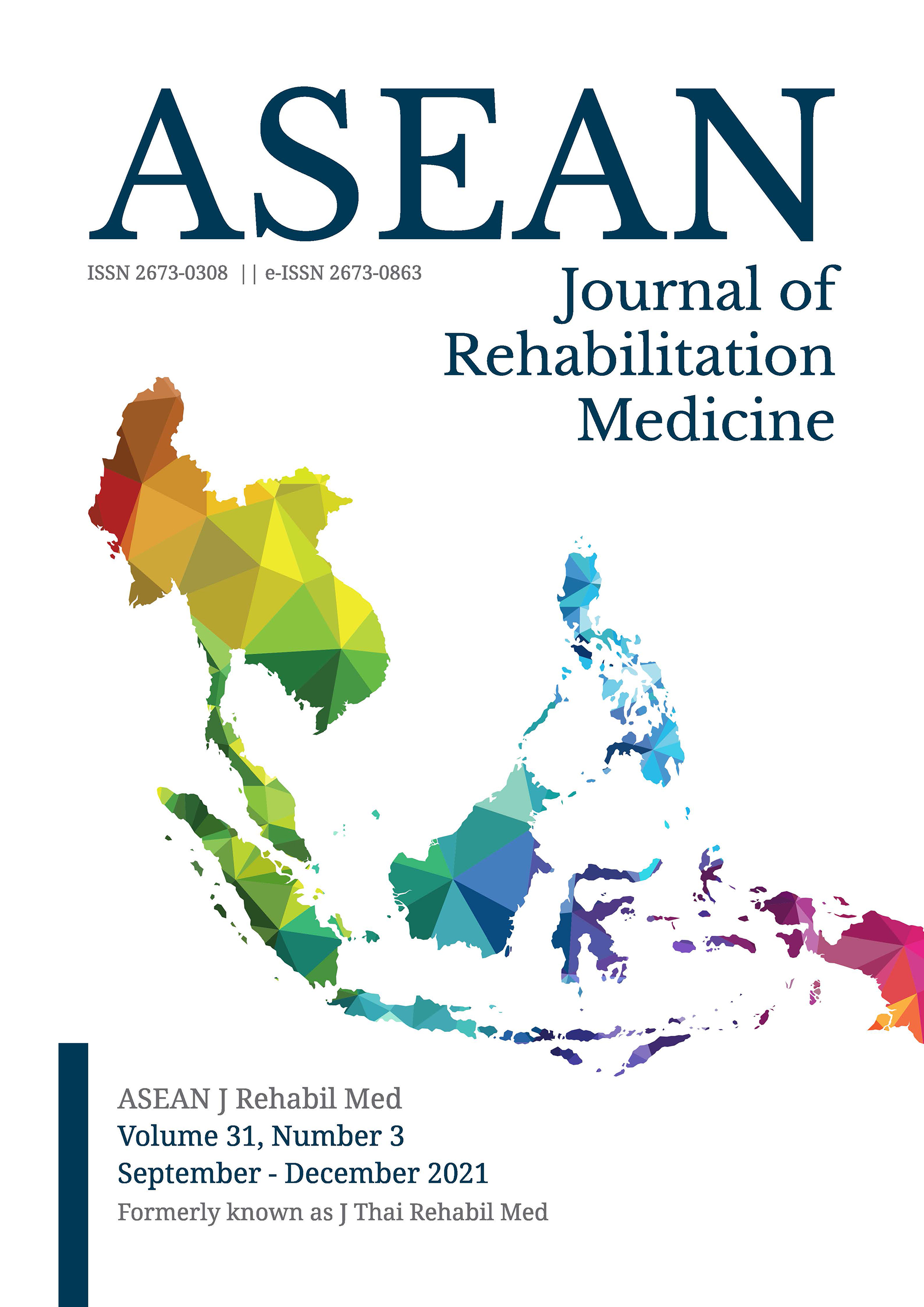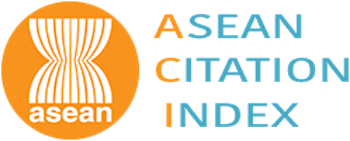Known-Group Validity and Inter-Rater Reliability of the Dynamic Loewenstein Occupational Therapy Cognitive Assessment (DLOTCA) - Thai Version
Keywords:
Dynamic Loewenstein Occupational Therapy Cognitive Assessment, cognitive impairment, psychometric property, neurological dysfunction, occupational therapyAbstract
Objectives: To investigate the known-group validity and inter-rater reliability of the Dynamic Loewenstein Occupational Therapy Cognitive Assessment (DLOTCA) - Thai version.
Study design: Descriptive cross-sectional design.
Setting: Four hospitals and four community rehabilitation centers in Chiang Mai province, Thailand.
Subjects: Thirty-seven patients with cognitive impairment and 37 healthy subjects were recruited by using the purposive sampling method.
Methods: The DLOTCA - Thai version was administered to the subjects. People with cognitive impairment were evaluated by two occupational therapists. The known-group validity was determined by using a comparative design between the groups with the Mann-Whitney U test and within the groups with the Wilcoxon signed-rank test. The reliability between the two raters was analyzed by using the intra-class correlation coefficient (ICC).
Results: The DLOTCA - Thai version successfully differentiated the pre-mediation scores between the two groups. People with cognitive impairment showed lower cognitive abilities and needed higher levels of mediation. Significant differences were found between the pre- and post-mediation scores within each group, which indicated high known-group validity of the DLOTCA - Thai version. The ICC between the two raters ranged from 0.914 to 1.000 that showed the high inter-rater reliability of the instrument.
Conclusions: From the results of the high degree of the known-group validity and inter-rater reliability, the DLOTCA - Thai version is an effective tool for identifying cognitive abilities in neurological dysfunction with cognitive impairment in clinical settings. This assessment tool also suggests potential change and provides an indication of the level of mediation that would benefit cognitive intervention.
Keywords: Dynamic Loewenstein Occupational Therapy Cognitive Assessment, cognitive impairment, psychometric property, neurological dysfunction, occupational therapy
References
Al-Qazzaz NK, Ali SH, Ahmad SA, Islam S, Mohamad K. Cognitive impairment and memory dysfunction after a stroke diagnosis: a post-stroke memory assessment. Neuropsychiatr Dis Treat. 2014; 10:1677-91.
Sun JH, Tan L, Yu JT. Post-stroke cognitive impairment: epidemiology, mechanisms and management. Ann Transl Med. 2014;2. doi: 10.3978/j.issn.2305-5839.2014.08.05.
Till C, Colella B, Verwegen J, Green RE. Postrecovery cognitive decline in adults with traumatic brain injury. Arch Phys Med Rehabil. 2008;89(12 Suppl):S25-34.
Gillespie DC, Bowen A, Chung CS, Cockburn J, Knapp P, Pollock A. Rehabilitation for post-stroke cognitive impairment: an overview of recommendations arising from systematic reviews of current evidence. Clin Rehabil. 2015;29:120-8.
McDonald MW, Black SE, Copland DA, Corbett D, Dijkhuizen RM, Farr TD, et al. Cognition in stroke rehabilitation and recovery research: consensus-based core recommendations from the second stroke recovery and rehabilitation roundtable. Int J Stroke. 2019;14:774-82.
Whyte E, Skidmore E, Aizenstein H, Ricker J, Butters M. Cognitive impairment in acquired brain injury: a predictor of rehabilitation outcomes and an opportunity for novel interventions. PM R. 2011;3(6 Suppl 1):S45-51.
Munkhetvit P. Occupational therapy evaluation for adults with physical dysfunction. Chiang Mai: Siampimnana; 2017.
Grigorenko EL. Dynamic assessment and response to intervention: two sides of one coin. J Learn Disabil. 2009;42:111-32.
Haywood HC, Tzuriel D. Applications and challenges in dynamic assessment. Peabody J Educ. 2002;77:40-63.
Katz N, Livni L, Erez AB, Averbuch S. Dynamic Loewenstein Occupational Therapy Cognitive Assessment for adults manual. Wayne, NJ: Maddak; 2011.
Toglia JP. The dynamic interactional model of cognition in cognitive rehabilitation. In: Katz N, editor. Cognition, occupation, and participation across the life span: neuroscience, neurorehabilitation, and models of intervention in occupational therapy. Bethesda, MD: American Occupational Therapy Association, 2011. p. 161-202.
Tzuriel D. Revealing the effects of cognitive education programmes through dynamic assessment. Assess Educ. 2011;18:113-31.
Wiedl KH. Dynamic testing: a comprehensive model and current fields of application. J Cogn Educ Psych. 2003;3:93-119.
Katz N, Livni L, Erez AB, Averbuch S. Dynamic Lowenstein Occupational Therapy Cognitive Assessment: evaluation of potential to change in cognitive performance. Am J Occup Ther. 2012;66:208-14.
College of Health. Contextual Memory Test (CMT) [Internet]. Salt Lake City: College of Health; [cited 2018 June 12]. Available from: https://www.yumpu.com/en/document/read/43507176/octh-6260-spring-assessment-rating-form
College of Health. Dynamic assessment of categorization TCA: the Toglia Category Assessment [Internet]. Salt Lake City: College of Health; [cited 2018 June 12]. Available from: https://health.utah.edu/sites/g/files/zrelqx131/files/files/migration/image/tca.pdf
Vancouver Coastal Health and Providence Health Care. Occupational therapy cognitive assessment inventory [Internet]. Vancouver, BC: Vancouver Coastal Health and Providence Health Care; 2012 [updated April 2014; cited 2018 May 27]. Available from: https://professionals.wrha.mb.ca/old/professionals/cognition/files/CogAssess14.pdf
Lund K, Oestergaard LG, Maribo T. Danish translation and adaptation of Loewenstein Occupational Therapy Cognitive Assessment second edition (LOTCA-II). Scand J Occup Ther. 2013;20:302-5.
Marques NCF, Matteuci M, Mendes RS, Medeiros ASd, Kuga J, Machado AF, et al. Cross-cultural adaptation of the DLOTCA-G (Dynamic Lowenstein Occupational Therapy Cognitive Assessment - for geriatric population) to Portuguese. Braz. Jour. Occup. Ther. 2015;23:251-60.
Oratai P, Phumonsakun S. Power analysis and sample size estimation using G*Power program. Bangkok: Pimdee; 2013.
World Health Organization. Process of translation and adaptation of instruments [Internet]. Geneva: World Health Organization; [cited 2018 May 21]. Available from: https://www.coursehero.com/file/30372721/WHO-Process-of-translation-and-adaptation-of-instrumentspdf/
Singhasiri P. Cultural validity and reliability of the Dynamic Lowenstein Occupational Therapy Cognitive Assessment (DLOTCA)-Thai version [dissertation]. Chiang Mai: Chiang Mai University; 2020.
Boongrid P. Mental State Examination T10: the dementia association of Thailand newsletter tenth edition [Internet]. 2017 [cited 2021 July 6]. Available from: https://thaidementia.com/newsletter/DAT_news_letter_10.pdf
Kijpredaborrisut B. Technique of research data collection instrument formation. Bangkok: Jamjuree Prodak; 2006.
Pengsawad V. Research methodology. Bangkok: Suveerisan; 2008.
Radomski MV, Morrison M, Latham CAT. Assessing abilities and capacities: cognition. In: Radomski MV, Latham CAT, editors. Occupational therapy for physical dysfunction. Baltimore: Lippincott Williams & Wilkins; 2014. p. 121-43.
Itzkovich M, Elazar B, Averbuch S. Loewenstein Occupational Therapy Cognitive Assessment LOTCATM manual second edition. Pequannock, NJ: Maddak; 1993.
Katz N, Hartman-Maeir A. Higher-level cognitive functions enabling participation: awareness and executive function. In: Katz N, editor. Cognition, occupation, and participation across the life span: neuroscience, neurorehabilitation, and models of intervention in occupational therapy. Bethesda, MD: American Occupational Therapy Association, 2011. p. 13-40.
Munkhetvit P. Theoretical base for cognitive-perceptual intervention. In: Munkhetvit P, editor. Occupational therapy intervention for cognitive impairment. Chiang Mai: Darawan Printing; 2008. p. 1-22.
Behling O, Law K. Translating questionnaires and other research instruments: problems and solution. London: Sage Publications; 2000.
Ratchagit T. Why training is important to an organization? [Internet]. Thailand: Tada Ratchagit; 2018 [updated 11 June 2019; cited 2020 November 2]. Available from: https://th.hrnote.asia/orgdevelopment/th-trainingofhr-181226/.
Downloads
Published
How to Cite
Issue
Section
License
Copyright (c) 2021 ASEAN Journal of Rehabilitation Medicine

This work is licensed under a Creative Commons Attribution-NonCommercial-NoDerivatives 4.0 International License.






